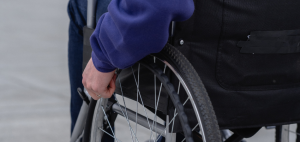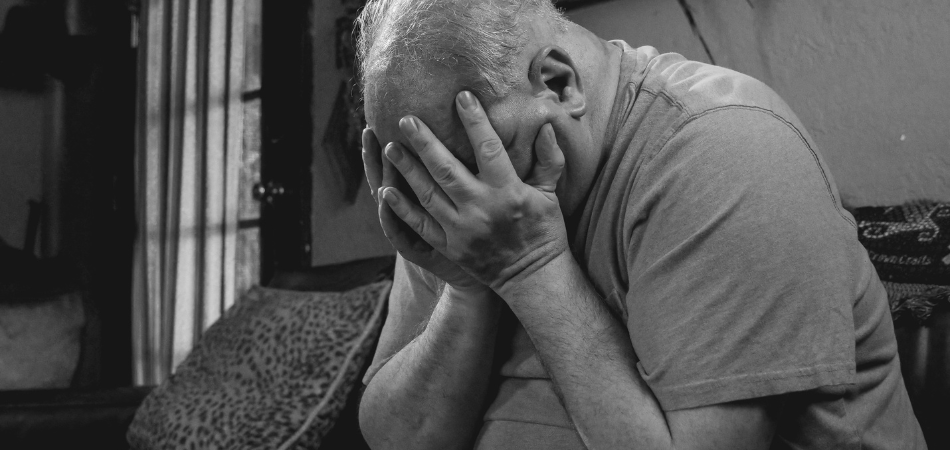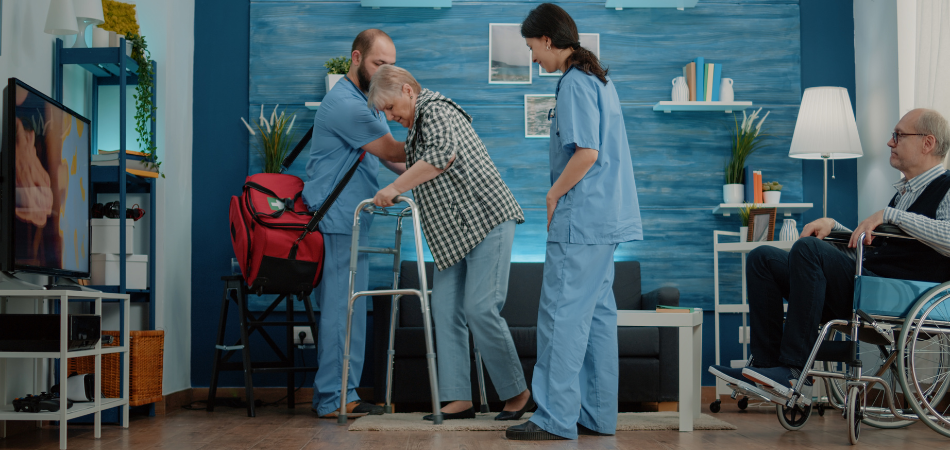At Valorum Care Group, we understand that individuals experiencing immobility, whether due to chronic illness, injury, or age-related conditions, require specialised care and support. Our approach is designed to provide compassionate, comprehensive care that ensures dignity, independence where possible, and quality of life for those who are fully dependent on our carers. This article explores the key aspects of immobility, its impact on individuals, the role of carers, and the specialised programmes we offer to support those who are immobile.

Our Client Care Team are available to answer your questions and can assess the client and design an individualised care plan.
Contact Us Today
Understanding Immobility
Immobility is a state in which an individual is unable to move or has severely restricted movement. It can affect individuals in varying degrees, from those who are bedridden to those who may be able to sit but are unable to move independently. Immobility can result from a wide range of conditions, including:
- Neurological disorders such as stroke, multiple sclerosis, or Parkinson’s disease
- Chronic illnesses like arthritis or severe respiratory conditions
- Traumatic injuries including spinal cord injuries or fractures
- Age-related frailty, which leads to loss of muscle strength and balance
- Post-surgical recovery, where individuals need temporary or long-term support
For fully dependent individuals, immobility is more than a physical limitation. It impacts every aspect of their daily life, requiring assistance with activities such as dressing, bathing, eating, and repositioning. The consequences of immobility can also extend to mental health, with isolation and feelings of helplessness commonly reported among those who are unable to engage in daily activities without assistance.
Impact of Immobility on Health
Immobility has far-reaching effects on an individual’s physical and mental well-being. The lack of movement can lead to several health complications, many of which can become chronic or life-threatening if not properly managed. At Valorum Care Group, we place a strong emphasis on addressing these health concerns through proactive, personalised care plans.
Physical Health Complications
- Pressure Ulcers (Bedsores) Pressure ulcers, or bedsores, are one of the most common issues faced by immobile individuals. When a person is unable to change position frequently, the continuous pressure on specific areas of the body, such as the heels, back, and hips, can cause skin breakdown. If not treated promptly, pressure ulcers can become infected and lead to further health complications.
- Muscle Atrophy When muscles are not used regularly, they begin to weaken and shrink in size, a condition known as muscle atrophy. This loss of muscle mass further limits an individual’s ability to move, even when assisted, and can lead to a cycle of increasing dependency.
- Deep Vein Thrombosis (DVT) Immobility increases the risk of blood clots forming in the veins, particularly in the legs. This condition, known as deep vein thrombosis, can become life-threatening if a clot travels to the lungs, causing a pulmonary embolism. Prevention of DVT through movement, even passive exercises, is a critical part of our care programme.
- Respiratory Infections For immobile individuals, shallow breathing or an inability to move can lead to a build-up of fluids in the lungs, increasing the risk of respiratory infections such as pneumonia. Our carers are trained to monitor respiratory health and encourage deep breathing exercises or the use of equipment to help with lung function.
- Constipation Immobility can slow down digestion, leading to constipation and other gastrointestinal issues. A well-balanced diet, hydration, and appropriate medication management are crucial components of our care plans to prevent such complications.
Mental and Emotional Impact
- Depression and Anxiety The inability to move freely or engage in activities independently can lead to feelings of frustration, helplessness, and isolation. Over time, these feelings may contribute to depression or anxiety. At Valorum Care Group, we understand the importance of mental well-being, and we ensure that our carers provide not only physical support but also emotional companionship.
- Loss of Dignity and Independence Many individuals who require full assistance with ADLs experience a sense of loss of dignity. Simple tasks that they once performed independently now require the help of others, which can affect their self-esteem. Our carers are trained to approach every aspect of care with respect and sensitivity, promoting as much independence as possible and involving individuals in their care decisions.
- Cognitive Decline For those who are immobile due to neurological conditions, cognitive decline may be an additional concern. Lack of physical activity and social engagement can exacerbate cognitive impairment. To combat this, we provide cognitive stimulation activities tailored to the individual’s abilities and interests.

Role of Carers in Supporting Immobile Individuals
At Valorum Care Group, our carers play a vital role in the lives of those who are immobile. We believe in providing a holistic approach to care, which means addressing the physical, emotional, and social needs of every individual. Our carers are trained in a range of skills and techniques that allow them to provide high-quality, compassionate care for immobile individuals.
Personalised Care Plans
Each individual’s needs are unique, and so are their care plans. Upon admission, a comprehensive assessment is conducted, considering medical history, current health status, mobility limitations, and personal preferences. This assessment allows our team to create a tailored care plan that promotes comfort, safety, and well-being.
Assistance with Activities of Daily Living (ADLs)
For fully dependent individuals, assistance with ADLs is a key aspect of daily life. Our carers provide support with:
- Bathing and personal hygiene: Maintaining cleanliness and skin integrity is essential, especially for individuals at risk of pressure ulcers.
- Dressing: Helping individuals choose clothing and dressing them in a way that maintains their dignity and comfort.
- Feeding: Assisting with meals, whether that involves feeding the individual or simply helping them access food and drinks.
- Mobility assistance: Using equipment such as hoists, wheelchairs, and walkers to help individuals move around as much as possible.
Preventing and Managing Health Complications
Our carers are trained to recognise and prevent common complications associated with immobility, such as pressure ulcers and DVT. Regular repositioning, passive exercises, and monitoring of vital signs are integral parts of daily care. In addition, carers work closely with physiotherapists and other healthcare professionals to ensure that the individual’s physical health is closely monitored and managed.
Emotional and Social Support
Providing emotional support is a crucial part of the carer’s role. Immobile individuals often experience loneliness or isolation, and the presence of a compassionate, understanding carer can make a significant difference in their mental well-being. Our carers are trained to listen, engage in conversation, and participate in social activities with the individuals they care for, helping to reduce feelings of isolation and improve overall mood.
Mobility Aids and Equipment
For individuals who are immobile, the right equipment can make a world of difference. At Valorum Care Group, we ensure that our clients have access to the latest mobility aids and equipment that can enhance their quality of life and improve safety. Some of the key mobility aids we provide include:
- Hoists and slings: These are essential for transferring individuals from bed to chair or for repositioning in bed. Our carers are trained in the safe use of hoists to ensure that transfers are done without causing discomfort or injury.
- Wheelchairs and mobility chairs: For those who are unable to walk, a wheelchair can provide mobility, allowing them to participate in social activities and spend time outside.
- Specialist beds and mattresses: Pressure-relieving mattresses and adjustable beds are crucial for preventing pressure ulcers and ensuring comfort during long periods of immobility.
- Standing frames and walking aids: For individuals who can stand or take a few steps with assistance, standing frames and walkers can help maintain muscle strength and prevent further decline.

Physiotherapy and Rehabilitation
Although some individuals may be permanently immobile, others may have the potential to regain some degree of movement through physiotherapy and rehabilitation. At Valorum Care Group, we work closely with physiotherapists to provide tailored exercise programmes that are designed to improve mobility, strength, and flexibility.
Passive Range of Motion Exercises
For individuals who cannot move on their own, passive range of motion exercises are essential for maintaining joint flexibility and preventing contractures. Our carers are trained to gently move the individual’s limbs through their full range of motion, ensuring that muscles and joints remain as healthy as possible.
Active Exercises for Partial Mobility
For individuals with partial mobility, physiotherapy programmes may include exercises that they can perform with assistance. These exercises focus on building strength and improving balance, which can contribute to increased independence in certain activities.
Hydrotherapy
Hydrotherapy, or water-based therapy, is another option for individuals with limited mobility. The buoyancy of water reduces the strain on joints and muscles, making it easier for individuals to move. At Valorum Care Group, we offer hydrotherapy sessions for those who may benefit from this type of rehabilitation.
Nutrition and Hydration
Proper nutrition and hydration are crucial for maintaining the health of immobile individuals. Immobility can increase the risk of malnutrition and dehydration, as individuals may have difficulty eating or drinking on their own. Our carers ensure that every individual receives balanced, nutritious meals tailored to their specific dietary needs.
Enteral Feeding
For individuals who are unable to eat by mouth, enteral feeding through a tube may be required. Our carers are trained in administering enteral feeds, ensuring that the individual receives the necessary nutrients to maintain their health.
Meal Planning and Assistance
For those who can eat independently with some assistance, our carers help with meal planning and preparation, ensuring that the meals are not only nutritionally balanced but also suited to the individual’s tastes and dietary restrictions. If an individual needs help with feeding, our carers assist them with dignity and respect, making sure that mealtime is a positive, social experience whenever possible.
Hydration Support
Dehydration is a common concern for immobile individuals, especially those who have difficulty swallowing or lack the ability to drink independently. Our carers monitor fluid intake carefully and provide regular assistance with drinking, using specialised cups or straws if necessary. For those who require it, intravenous or subcutaneous fluids may be administered under medical supervision.

Preventing and Managing Pressure Ulcers
Pressure ulcers, or bedsores, are a major risk for individuals who are immobile, especially those who are bedridden for long periods. At Valorum Care Group, we employ a range of strategies to prevent and manage pressure ulcers.
Repositioning
Regular repositioning is crucial to prevent prolonged pressure on any one part of the body. Our carers ensure that individuals are turned and repositioned at regular intervals, following care plans that are tailored to the specific needs and risks of each person. The use of appropriate cushioning and supports also helps to distribute weight evenly, reducing pressure points.
Skin Care
Maintaining healthy skin is another essential part of preventing pressure ulcers. Our carers use gentle cleansing products, keep the skin dry and moisturised, and inspect the skin daily for any signs of redness, irritation, or breakdown. Early intervention is key to preventing more serious skin damage, and our carers are trained to act quickly if any concerns arise.
Use of Specialised Mattresses and Cushions
Specialised pressure-relieving mattresses and cushions are an integral part of care for immobile individuals. These products help to distribute pressure more evenly and reduce the risk of pressure ulcers. Our care team works with equipment providers to ensure that each individual has the most suitable mattress or cushion for their needs.
Emotional and Psychological Support
The emotional well-being of immobile individuals is just as important as their physical health. Being unable to move independently can lead to feelings of frustration, helplessness, and social isolation. At Valorum Care Group, we prioritise emotional support as a core component of our care programme.
Building Trust and Relationships
One of the most important aspects of emotional support is building trusting relationships between carers and individuals. Our carers spend time getting to know each person, understanding their preferences, and involving them in decisions about their care wherever possible. This sense of partnership helps to foster a more positive outlook and reduces feelings of powerlessness.
Companionship and Social Engagement
Many immobile individuals experience loneliness, particularly if they are unable to participate in social activities independently. Our carers provide companionship through daily interactions, whether that’s engaging in conversation, reading aloud, or simply spending time together. We also encourage participation in group activities or events within the care setting, ensuring that individuals remain connected to their community.
Mental Health Support
For individuals who experience anxiety, depression, or other mental health challenges as a result of their immobility, additional mental health support is available. This may include counselling or therapy provided by trained professionals, as well as medication management where appropriate. Our carers work closely with mental health specialists to ensure that individuals receive the emotional and psychological care they need.
Our Client Care Team are available to answer your questions and can assess the client and design an individualised care plan.
Contact Us Today
Family Involvement and Support
Caring for an immobile individual is not only the responsibility of the care team but also an important aspect for their family members. At Valorum Care Group, we believe in fostering close relationships between our care team and the families of those we support. We understand that families may face emotional challenges, and we provide guidance, education, and support to help them through the process.
Family Education and Training
Families are encouraged to participate in the care of their loved ones, and we provide training to help them understand the specific needs of immobile individuals. This may include guidance on safe lifting and transferring techniques, skin care, and recognising signs of health complications such as pressure ulcers or respiratory infections.
Open Communication
We maintain open lines of communication with families, ensuring that they are kept informed of their loved one’s progress and any changes in their care plan. Regular meetings with the care team allow families to ask questions, express concerns, and contribute to decision-making processes.
Promoting Dignity and Independence
Even though immobility often means dependence on others for basic needs, it is essential to promote dignity and independence wherever possible. At Valorum Care Group, we empower individuals to maintain a sense of control over their own lives, despite their physical limitations.
Involving Individuals in Their Care
We believe that every person has the right to be involved in decisions about their care. Our carers actively involve individuals in daily choices, such as what to wear, what to eat, or how they would like their day to be structured. By offering choices, we promote a sense of autonomy and help maintain the individual’s self-esteem.
Encouraging Participation in Activities
We encourage participation in meaningful activities that are adapted to the abilities of each individual. These may include creative arts, music therapy, or gardening, all of which can be done with assistance. The goal is to provide a sense of purpose and achievement, even for those who are fully dependent on others.
Our Commitment
Our commitment to around the clock support, specialised adaptations, and a wide range of services ensures that residents receive the highest quality care in a warm and nurturing environment. We understand the unique challenges of ABI, and our experienced team is here to help residents on their journey to recovery and a fulfilling life.
If you are seeking the best care for your loved one with ABI, look no further than Valorum Care Homes. Contact us today to learn more about our care homes and how we can support your family.
